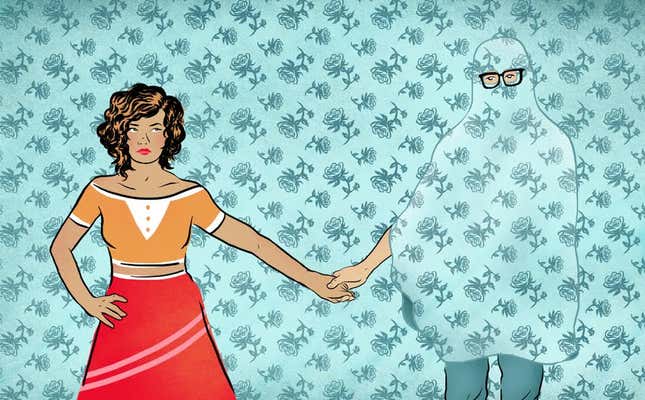Is It Harder to Ghost a Relationship or to Get Ghosted?
Latest

If you’ve ever been ghosted—your urgent pleas for contact suddenly ignored by a lover, or a prospective lover, or yes, even a friend—then you know the particular breed of torture, self-scrutiny, and turmoil the act summons. But how, we started wondering, does the ghoster feel?
Ghosting recently made fresh headlines when the world learned that Charlize Theron, along with the many other admirable traits she possesses, is apparently also a world-class ghoster—a person that’s really good at simply no longer talking to you over any medium, leaving no explanation, forcing you to spin out in all directions wondering what, exactly, you did to piss her off.
Jezebel’s Stassa Edwards noted that “Ghosting might be the shittiest breakup method, but generally a person worthy of ghosting has really done something really, truly terrible.” And after all, Theron ghosted the eminently ghostable Sean Penn. But regardless of how deserving he or other ghostees may be—and we can never really know, can we?—we tend to sympathize with them. It’s rougher, we think, to be left behind than to leave.
To be clear, there are levels of ghosting. A huge fight over a legitimate grievance that ends in one party’s silence is more understandable than when you’ve been cut off in the midst of believing the relationship to be humming along just fine—or worse, going great. This latter category are the ghostees who are left to put the pieces together, to put together a narrative from the crime scene where the relationship fizzled or crashed and burned—and to do this, as it happens, with no help from the key witness. Ghosting without any sense of warning or reason is truly crazy-making and should be illegal within the category
In a piece at Elle from last year, Nora Crotty rounded up a slew of awkward ghosting scenarios in this category, and boy, do they smart:
To name a few: There was the law student who “needed time to study” and then, post-graduation, still couldn’t find the time for me; the hotshot architect who mysteriously stopped existing on weekends; the hardcore band-frontman-turned-high school principal who went on a business trip to Mexico and, for all I know, just never came back; the jazz-educated med school student who was “just really bad at texting—my friends all bug me about it;” and the young English bartender who canceled our plans for a harbor cruise the morning of (I’d bought the tickets, BTW). (Oh, and P.S.: You all suck.)
Most of us imagine our ghosters as cold, or maybe even gleeful—at best, cruelly oblivious to our suffering. How can these ghosters not know what they are doing? They see those texts/emails/voicemails pile up, growing more anxious and neurotic by the word. Surely they understand the intensity of ghosting, what it does to the ghostee. And don’t they get filled with a nuclear self-loathing as a result?
In a piece at the New York Times by Valeriya Safronova, we hear from a few people who did the heave-ho-ing. Safronova says that many of these ghosters are in fact, contrite. What’s more, they know it’s their insecurity and immaturity driving the decision to bail without anything like a grown-up conversation. She interviews actress and comedian Jenny Mollen, who confesses she stopped talking to a man she’d been dating for three months after saying her grandmother had died. Safronova writes:
Her grandmother had died — months earlier. “He came to my house one night banging on my door, and I pretended I wasn’t there,” Ms. Mollen said. “I didn’t know how else to extricate from relationships. It was me being young and not knowing how to disappoint.” She theorized that people who fade away do so out of a desperate need to be loved, even after a breakup. “If you disappear completely, you never have to deal with knowing someone is mad at you and being the bad guy,” she said.
In another anecdote, Joe Stahl admits to Safranova that he stopped speaking to his boyfriend after a terrible fight that seemed irreconcilable:
“I knew that there were things that I couldn’t fix about myself that were making him angry,” Mr. Stahl said. “I felt like I was powerless and ashamed that I couldn’t be this person I wanted to be for him, which is why I deserted.”
Then there is just the situation where the ghostee’s actions have made it so that the ghoster simply can’t go into all the particulars as to why they are not interested in you or available—so they freeze up and freeze you out. Kate Eberstadt tells Safronova of a night spent talking with a man who later came to where she worked to ask her on a date:
-

-

-

-

-

-

-

-

-

-

-

-

-

-

-

-

-

-

-

-

-

-

-

-

-

-

-

-

-

-

-

-

-

-

-

-

-

-

-

-








































